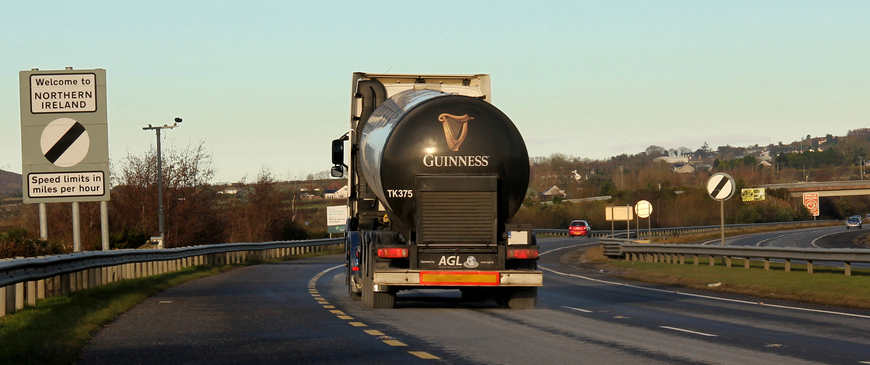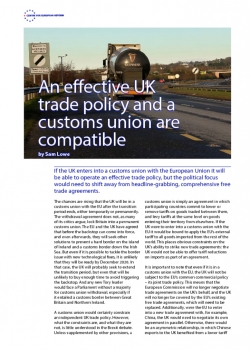
An effective UK trade policy and a customs union are compatible
If the UK enters into a customs union with the European Union it will be able to operate an effective trade policy, but the political focus would need to shift away from headline-grabbing, comprehensive free trade agreements.
The chances are rising that the UK will be in a customs union with the EU after the transition period ends, either temporarily or permanently. The withdrawal agreement does not, as many of its critics argue, lock Britain into a permanent customs union. The EU and the UK have agreed that before the backstop can come into force, and even afterwards, they will seek other solutions to prevent a hard border on the island of Ireland and a customs border down the Irish Sea. But even if it is possible to tackle the border issue with new technological fixes, it is unlikely that they will be ready by December 2020. In that case, the UK will probably seek to extend the transition period, but even that will be unlikely to buy enough time to avoid triggering the backstop. And any new Tory leader would face a Parliament without a majority for customs union withdrawal, especially if it entailed a customs border between Great Britain and Northern Ireland.
A customs union would certainly constrain an independent UK trade policy. However, what the constraints are, and what they are not, is little understood in the Brexit debate. Unless supplemented by other provisions, a customs union is simply an agreement in which participating countries commit to lower or remove tariffs on goods traded between them, and levy tariffs at the same level on goods entering their territory from elsewhere. If the UK were to enter into a customs union with the EU it would be bound to apply the EU’s external tariff to all goods imported from the rest of the world. This places obvious constraints on the UK’s ability to strike new trade agreements: the UK would not be able to offer tariff reductions on imports as part of an agreement.
It is important to note that even if it is in a customs union with the EU, the UK will not be subject to the EU’s common commercial policy – its joint trade policy.
It is important to note that even if it is in a customs union with the EU, the UK will not be subject to the EU’s common commercial policy – its joint trade policy. This means that the European Commission will no longer negotiate trade agreements on the UK’s behalf, and the UK will no longer be covered by the EU’s existing free trade agreements, which will need to be replaced. Additionally, were the EU to enter into a new trade agreement with, for example, China, the UK would need to negotiate its own agreement in parallel. Otherwise, in theory, there would be an asymmetric relationship, in which Chinese exports to the UK benefited from a lower tariff rate (because the UK would have to apply the EU’s tariff) but UK exporters would not receive reciprocal treatment from China. (In practice, the risk would probably be confined to Chinese goods entering the UK via the EU; the UK could continue to apply a higher tariff on direct imports from China up until it concludes a trade agreement.)
Many in the UK fear that this will lead to the UK facing similar problems to Turkey, whereby some countries that have entered into free trade agreements with the EU have refused to negotiate parallel FTAs with Turkey. In reality these fears, while real, are overstated. The UK is not comparable to Turkey – it is a larger, more developed and better regulated economy, and access to its market is more prized. Moreover, for some time the Commission has been sitting on proposals for modernising and improving the arrangement with Turkey with regard to third country agreements. Ideas that have been floated include a firmer EU line with FTA partners, obliging them to negotiate in parallel with customs union members. The UK-EU agreement could involve more concrete consultation mechanisms; perhaps even allowing the UK to observe but not vote in relevant EU trade policy committee meetings. The EU and the UK could seek to implement their trade agreements at the same time, to avoid asymmetries.
In a minimal customs union that covered only tariffs and quotas, the UK would be able to determine its external trade policy entirely free of EU influence in other areas. Being in such a customs union would place no constraints on the UK’s ability to negotiate in the areas of services, intellectual property, public procurement, data and regulatory barriers to trade in goods. (It would be more sensible for the UK to unilaterally align with EU rules in many of these areas, but given the EU’s desire not to split the four freedoms of the single market, the UK may not be able to persuade the EU to recognise British rules as equivalent to its own). The UK would have its own voice in some negotiations, for example the Trade in Services Agreement currently being negotiated by 23 members of the World Trade Organisation.
Comprehensive free trade agreements would be tricky, given the UK’s inability to make tariff concessions. But this need not prevent the UK from operating an effective trade policy.
Comprehensive free trade agreements would be tricky, given the UK’s inability to make tariff concessions. But this need not prevent the UK from operating an effective trade policy. As a high-income, services economy, an obvious priority would be easing the movement of people, technology and ideas. This would involve making it easier for people to provide services both inside and outside the UK by handing out more visas or removing regulatory barriers to services imports, either unilaterally or on the basis of reciprocity. Easing limits on movement would also mean rowing back on legislation that constrains one of the UK’s more successful export industries: its universities. Foreign graduates could be given more time to find a job before they must leave the country. The government could prioritise research co-operation agreements, such as that between the EU and Israel.
Such a trade strategy might also involve government investment in frontier industries – for example, tidal energy production – in order to develop a unique base of expertise that could be sold across the world. Improving Britons’ poor educational attainment in mathematics and science – core subjects needed for many exporting sectors – should be a priority, as should improving transport, telecommunications and energy infrastructure, especially in post-industrial towns and cities. That would make it easier for workers to travel to jobs in high productivity, exporting companies, ease the distribution of those companies’ products and reduce their production costs.
The bigger impediment to the UK’s trade ambitions is not a customs union with the EU, but the Home Office.
None of the above requires the UK to set tariffs, but would create opportunities in sectors and industries consistent with the UK’s comparative advantage. However, it does require a retreat from the obsession with FTAs, and a more holistic approach to trade policy. And it requires Britain’s politicians to think differently about trade policy, seeing it less as a political tool to generate favourable headlines, and more as an extension of a broader economic strategy. UK policy-makers would also have to change the politics of immigration to achieve such a vision for ‘Global Britain’, because the UK cannot both aspire to be a services powerhouse and crack down on immigration. The bigger impediment to the UK’s trade ambitions is not a customs union with the EU, but the Home Office.
Sam Lowe is a senior research fellow at the CER.


Comments